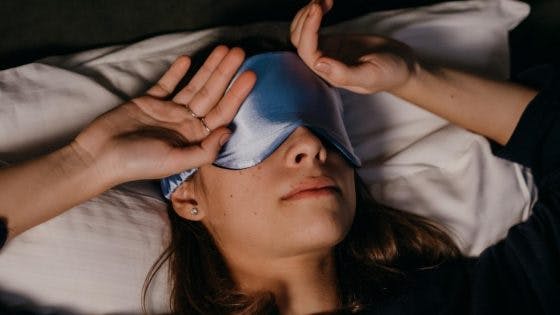How To Reset Your Body Clock
8 minutes read
Many of us unknowingly pick up bad sleep habits throughout our lives. As a result, we don’t get the recommended seven to nine hours of sleep every night. Or, the quality of our sleep is so poor that we’re left feeling exhausted the following day.
The solution? It may be time to learn how to reset your body clock by ditching bad sleep habits and learning techniques to help you get a restful night’s sleep.
But first, let’s understand what a body clock is and how it works.
What is a body clock?
Two primary processes dictate when we sleep and when we stay awake: sleep/wake homeostasis and the circadian rhythm.
According to Sleep Foundation, “sleep/wake homeostasis balances our need for sleep…with our need for wakefulness. When we’ve been awake for a long period of time, our sleep drive tells us that it’s time to sleep. As we sleep, we regain homeostasis, and our sleep drive diminishes. Finally, our need for alertness grows, telling us it’s time to wake up.”
On the other hand, the circadian rhythm is our 24-hour body clock. It relies on environmental cues (mainly sunlight or the lack of it) to decide when it’s time to be alert or to rest.
“Every cell in our body runs on our circadian rhythm,” says Natasha Evans, Nutritional Therapist and Health Coach. Evans uses a functional medicine approach in her practice, which means she looks at diet and other lifestyle factors when trying to help her clients. And sleep is a major one.
She explains: “Even our microbes in our microbiome utilise this 24-hour body clock. So if it’s disrupted, it affects our sleep and can also upset our immune system, gut microbiome, etc.”
Evans emphasises the importance of light exposure to the circadian rhythm. “Light exposure is probably the most important variable in regulating your circadian rhythm and therefore your sleep,” she says. “I discuss this with all my clients because it is crucial to health.”

Is everyone’s body clock the same?
Although we all require an average of eight hours of sleep per night, the exact number of hours can vary from person to person. For instance, some people feel rested with just six to seven hours, and others require a full nine hours.
Similarly, the exact time of day when you feel most alert is also unique. Some get most of their work done in the mornings, and others may find that they are more productive in the evenings or nights. Harvard Medical School defines these personalities as ‘larks’ and ‘owls’ – the former being morning people and the latter evening people. These differences tend to be passed on through genetics.
Your circadian rhythm changes as you pass through key stages of your life. For example, when you go from infancy to childhood, during adolescence and then again during old age.
Your body clock is also affected by certain lifestyle choices. People who work night shifts, for example, have to reset their body clocks to stay alert during the night hours and asleep during the day. But you could use the same strategies if you’re trying to reset your biological clock to get better sleep at night. Here’s how to do it.
How to reset your body clock (circadian rhythm)
1. Go for a morning walk
“To optimise your light exposure and sleep better, get as much natural light as possible during the day and be exposed to as little light as possible after sunset,” says Evans.
“Get out first thing in the morning and expose your eyes (no sunglasses!) and skin to daylight for 15 minutes. If you can’t get out first thing in the morning, open a window, sit next to it, and make sure you get outside for at least 30 minutes later in the day.”
Tip:Don’t forget to wear your SPF when heading out in the sun. We recommend the UV PLUS [5P] Anti-Pollution Sunscreen, £33, which protects the skin from harmful UV rays, blue light and pollution.
2. Get enough vitamin D
Evans adds: “The other benefit of daytime light is that we require sunlight to produce vitamin D. We can get some vitamin D from our food, but the sun is the most effective way to get it. Vitamin D supplementation has been shown to improve sleep quality, latency and duration in people with sleep disorders.”
3. Watch what you eat
The quality of your diet impacts hormonal pathways that influence sleep quantity and quality. Evans explains: “low fibre, low protein and high sugar diets have been associated with poorer sleep outcomes. But a diet full of plants, oily fish, olive oil, good quality meat, wholegrains, nuts, herbs and spices is likely to benefit sleep quality.”
Evans adds that certain nutrients have also been shown to influence sleep. “For example, a diet high in tryptophan (an amino acid that’s a precursor to serotonin, which influences sleep and mood) can lead to a more restful sleep,” she says. “Foods high in tryptophan include milk, cheese, eggs, fish, chicken and seeds. Now the glass of milk before bed tradition makes sense!”
Other nutrients that can help include magnesium, B1, folate, iron, selenium, zinc and vitamin D. Magnesium salt baths before bed or supplementation may help, but always consult a health practitioner before supplementation.
Evans also encourages you to keep your gut health (an area she specialises in) in check for better sleep. “Your diet directly impacts the health of your gut microbiome, which can then influence your sleep via various pathways, including the gut-brain axis and its role in producing serotonin,” she explains. “Your gut produces about 90% of your body’s serotonin! So a diet rich in probiotic and prebiotic foods can help support a healthy microbiome.”
Did you know: Not only does our diet influence sleep, but our sleep influences our diet, too. “When we sleep poorly, we produce more of our hunger hormone, ghrelin, and less of our fullness hormone, leptin,” says Evans. “This results in increased appetite the next day. We also tend to crave higher calorie foods, often high in sugars and simple carbohydrates.”
4. Watch when you eat
In addition to checking the nutritional value of your meals, it’s also important to revaluate your mealtimes.
“Food timing also matters – particularly what you eat close to the bed,” Evans says. “A high carbohydrate meal close to bedtime (up to two hours before bed) negatively impacts sleep quality. On the other hand, a high carbohydrate dinner eaten four or more hours before bed doesn’t seem to have that effect.”
She explains that a variety of factors are at play here. Firstly, it can be harder to sleep if blood sugar is elevated before bed. Secondly, when you eat, your core body temperature rises. To fall asleep, we need our core body temperature to drop. So, eat dinner at least two to three hours before bed. This will allow your body to focus on sleep rather than digestion.
5. Save exercise for the AM
Exercise is vital for good health, but anything too vigorous too close to bedtime may not be the best idea. That’s because exercise raises the core body temperature. And as we learned, we need the temperature to drop to sleep.
However, research has shown that mild to moderate exercise may be all right if you do it at least an hour before bedtime.
6. Switch to water
Beverages like coffee, tea and anything caffeinated can majorly impact your sleep.
“Caffeine resets your body clock and has an average half-life of about 5 hours,” says Evans. “This means caffeine lingers in the body for a long time and, as a stimulant, can disrupt sleep latency and quality. If you can, I would avoid drinking caffeine after midday, so it doesn’t affect your sleep.”
Similarly, it’s best to avoid alcohol before bed too. Alcohol is a sedative. So, while it may get you to sleep faster, it significantly disrupts your sleep quality.
7. Revaluate your home lighting
Light is a significant factor in regulating your circadian rhythm because your body clock follows the patterns of the sun. So, avoiding harsh artificial lighting in the evenings is vital.
“Blue light from artificial lights and devices suppresses melatonin, our sleepy hormone,” says Evans. “Keep artificial light off or as low as possible in the evenings. Go for side lighting rather than overhead lighting.”

8. Put screens away
Netflix before bed may sound fun, but the blue light emitted from your screen also sends your body mixed signals about sleep.
The same rule applies to phone screens. So, it’s best to put your devices away a few hours before you plan to sleep. Instead, listening to podcasts, music or even reading a physical book can help you wind down without exposing you to excess light.
Tip: “Consider buying blue light-blocking glasses after sunset,” advises Evans.
9. Take time to relax
Stress suppresses melatonin production. So, taking some time for yourself in the evening to do a sleep self-care routine, some breath work, meditation or journalling can be very helpful.
Read: How breathwork can improve your wellbeing
10. Be consistent
To reset your sleep routine, you need to be patient and consistent. Your body will take a while to readjust to your new routine. Try to go to bed at the same time every day. Similarly, ensure you wake up at the same time every day – weekends included!
Remember that if you have trouble sleeping and making lifestyle tweaks doesn’t seem to help, it’s always best to consult a doctor.
Next read: How To Sleep In Hot Weather
Sign up for our newsletter
We will keep you in the loop for special offers, exclusive gifts and product news.

